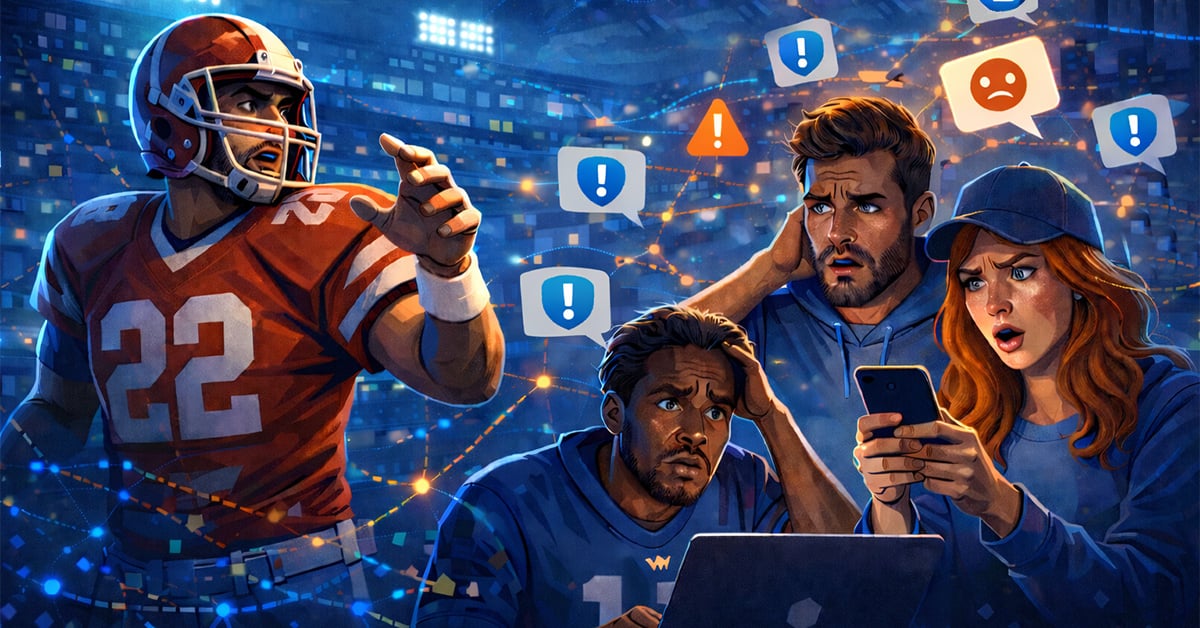By Alex Mendela
Alethea detects narratives and social media manipulation emanating from online communities that usually try to attack our customers, including by providing an understanding of conversations in conspiratorial communities. These communities, and the false or misleading narratives they espouse, pose an increasing risk to the reputation and overall health of businesses in a range of different industries. However, damaging communities don’t have to criticize a company’s brand to negatively impact their public reputation, license to operate, or value. Sometimes, organizations have to figure out what to do in navigating praise—not criticism—from communities whose values and messaging go counter to their brand. What do you do when conspiracy theorists become your biggest fans? How do you even know it started? What action will you take—if you should take any at all?
It’s important for companies to recognize how their brand gets manipulated by conspiracy communities. There’s a grave risk of inaction. When brands get weaponized, it can cause significant harm, including to brand, reputation, and Environmental, Social, and Governance (ESG) efforts. It can cause risks of counter narratives calling for boycotts or make them the center of a false story. At worst, it can also mean that a brand is used as a symbol to recruit individuals into groups that conduct illegal or nefarious activity, such as intentional acts of physical violence.
At this point, you’ve probably heard of QAnon—a movement of people who believe that a secret, shadowy cabal made up of influential individuals is inappropriately exercising their power for political and financial gain. But did you know that QAnon rhetoric misappropriates popular film narratives produced by the entertainment industry? Using cultural touchpoints, it draws people into the movement and communicates using pop references—creating an unsavory affiliation for renowned movies, companies, and talent.
How does QAnon Misappropriate Pop Culture?
At Alethea, we actively seek to understand the observed scenarios where expressly fictional material like films and novels are presented and referenced to affirm the truthfulness of conspiracy theory narratives. We know that most if not all of QAnon’s conspiracy theories are simply re-hashed versions of older ones. For example, QAnon followers commonly believe their own version of a medieval conspiracy claiming that there is a “deep state” cabal of Jews that traffics Christian children for their blood. To the average consumer, shareholder, and employee this may sound ridiculous, however the ardent believers of this conspiracy have grown. The antisemitic undertones of QAnon and recycling of narratives and themes is significant. It also helps to determine the patterns and context that can serve as a guide for what kinds of content, imagery, and storylines are at risk to be co-opted. Leaders and decision makers should be concerned that QAnon or other like-minded groups may use their films as an affirmation and justification of their conspiracy theories, extremist beliefs, and illegal activity-–but also understand that the nature of the conversation and the context can help to rightsize an organization’s approach to managing this risk.
The QAnon movement frequently looks to films to adopt aesthetics and confirm their conspiratorial worldview. The movement uses fictional stories to blend the line between reality and fantasy until it is practically indistinguishable. The free-flowing relationship between facts and entertainment only increases the likelihood that fictional content will be misappropriated. The risk is that popular content, key talent, and companies within the entertainment industry can be praised by conspiracy and extremist communities, used to recruit new members, and used to justify their online and offline activity.
What are some examples of this? How integrated into QAnon culture is it really?
Film plays a foundationally important role in the QAnon movement’s identity and mythos. Connections to popular culture can act as a gateway into the movement via bonding through common interests and recruiting new members. The QAnon movement has weaponized content, phrases, and symbols directly from The Matrix series, The Godfather Part III, and the Punisher from the Marvel universe, among others, to affirm their conspiracy theories of corruption and vigilantism. Once a symbol or theme is integrated into QAnon culture and widely accepted, there is no going back: it is a corporate strategy risk that your franchise or business will have to learn to manage.
QAnon appeals to followers through its common slogan, Where We Go One We Go All or WW1WGA, which is a direct reference to the 1996 film White Squall, a movie about a ship sailing through an intense storm. This theme coincides with their apocalyptic vision of what they call “the Storm,” in which QAnon’s political opponents will be rounded up, tried, and executed. This imagery and narrative is co-opted by the QAnon movement as a validation that they ultimately will prevail and creates a sense of community, providing both a cultural touchpoint and a motivation for prospective newcomers.
When individuals find QAnon, they are then what’s referred to as red-pilled, or exposed to all kinds of falsehoods that are presented as truth to lift their veil of “ignorance.” By presenting this information, and adopting the red-pilling reference from the Matrix, the conspiracy is again using the image of unlocking the new believers' full potential as a method of member recruitment—when in reality it's presenting a fictional element from a highly visible and famous film as fact. No filmmaker, actor, or production company goes through grueling production schedules to have their work used to further conspiracies that run counter to their brand and that can potentially negatively impact their professional reputation.
From a brand, reputation, and business perspective, it’s critical that those within the entertainment industry understand the severity of the threat. Regardless of the group or community co-opting popular culture or content, the business risks remain the same: threats to brand and reputation, license to operate or conduct business, and physical safety of executives or key talent. Imagine your film or production company becomes publicly associated with the conspiracy theories and rhetoric used by groups like white supremacists, neo-fascists, and other extremists to recruit new members. While unintentional, the damage to the company’s reputation, ESG efforts, and customer base is potentially irreversible.
What can you do about it?
The key to assessing the risk of QAnon or other like-minded communities co-opting a storyline concept or piece of content lies in understanding the broader narratives and sub-narratives that these communities adhere to. It's critical to understand these communities so that you can understand the true risk that any content, imagery, and storylines may pose if they were to get adopted by QAnon communities. This knowledge can help inform marketing strategies that work to advance a series or film, help avoid a brand and reputational crisis, and limit conspiracy theorists ability to absorb your work into their ethos.
During a premiere or a marketing launch, Alethea can conduct early detection efforts to incorporate creative works into conspiracies and false narratives. This creates the opportunity for employing tactics that prevent full integration and adoption, potentially avoiding a crisis with major business and financial implications. We can often catch new conspiracies at the first post, not waiting until it trends on Twitter to be able to alert you to when your brand may be getting co-opted. Our experts, who have a deep understanding of the nuances and culture within QAnon and extremist communities, will then work with you to contain the narrative and navigate the conversation. With time on your side, we can help mitigate the situation before it escalates to brand and company boycotts, threats to physical safety, and other damaging activity.
Every entertainment company has unique assets in the form of popular series, renown symbols, major narratives and themes, and key executives and talent that serve to differentiate them from their competitors in the industry. Creating compelling stories and protecting them against being co-opted is what’s most important.




.png)
